"On the chess-board lies and hypocrisy do not survive long." -Emanuel Lasker
Along with art, music, math, and sports, it's well known that the game of Chess is one of the best activities a child can engage in to develop their mind. I can think of no better song than Kings and Queens by Loudon Wainwright III to lead you through this article, so here's a great little live version of it:
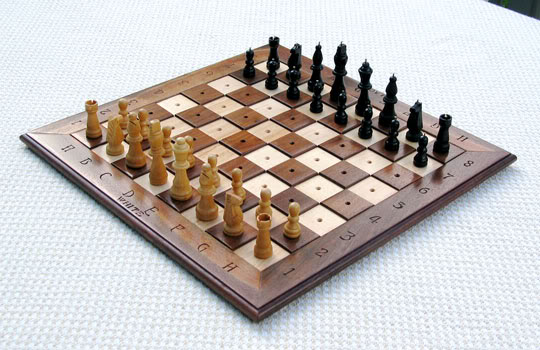
First off, chess is always a completely fair competition. Everyone starts with the same pieces, and at the outset of a game, even the most amateur player starts out equally with a World Champion Grandmaster. A peasant is equal to a president, a child to an adult, and a pauper the equal of a king. Your physical strength and size will not help you, but to succeed at chess there are some fundamental skills you must master.
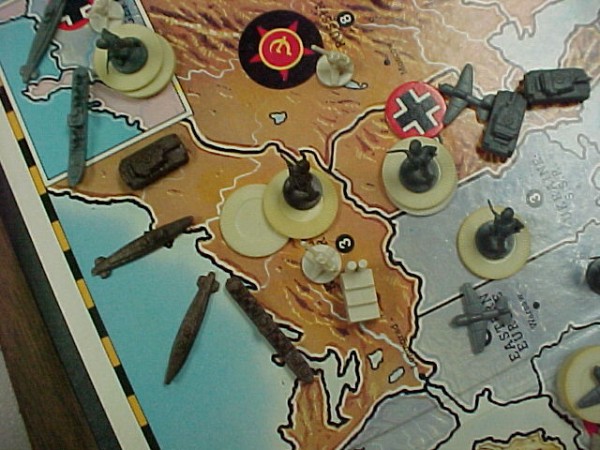
Strategy and the importance of position, both objectively and relative to your opponent. The ability to decide when to take a risk and when to play it safe. When to attack and when to defend. When to push forward and when to retreat. And the skill of accurately evaluating a difficult position, and deciding on what move offers you the best chances of victory. All of these, as well as many others, are a fundamental part of the game of chess.
Which is why I'm so pleased about the success of programs such as Chess-in-the-schools.
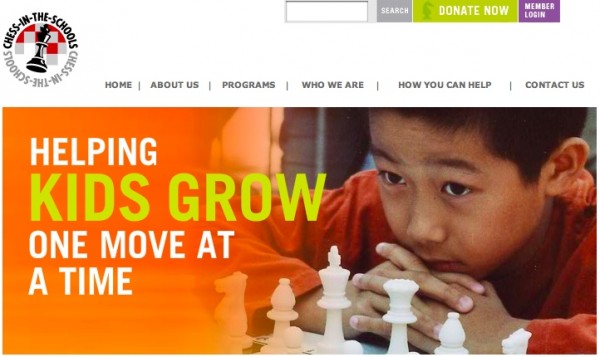
Because, in addition to the game-playing skills, chess can teach you important skills for life as well. How to be a gracious winner, how to accept your losses (and trust me, no matter how good you are, you will often find yourself on the losing side at chess), and to realize that, at the end of the game, everyone is equal again.
But it's one thing to talk about it, and another to actively be involved in making it happen. Which is why this weekend I want to give a huge shout-out to my friend Thomas in Tuscaloosa, Alabama, who's helping make this happen:
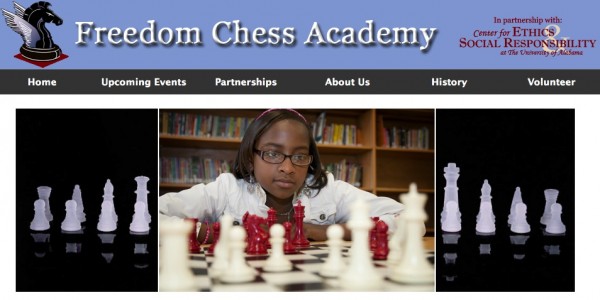
It's as straightforward as teaching kids and adults the rules, giving them boards, pieces, a chess clock, and a place to play, and Freedom Chess Academy is doing just that! In public libraries, in schools, and by organizing local (and state) chess tournaments, chess is one of the best ways to help children (and even adults) develop many of the skills necessary for academic and life success.
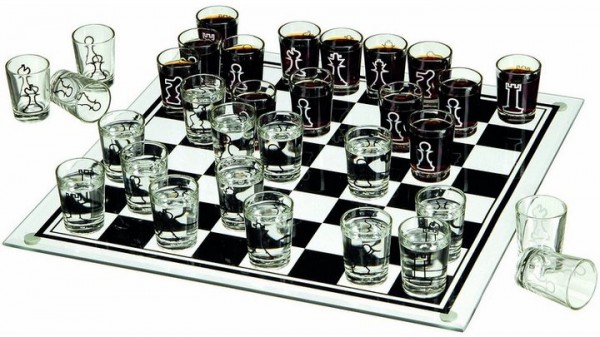
Which isn't to say that you shouldn't also have fun with it! (After all, even on a good day, I'm only at the level of a Class B player.) But I wanted to point out a lot of good work going on, thank everyone who's involved with it, and to congratulate Thomas and everyone else on hosting the 2010 Alabama State Championship this weekend! You're all awesome for making it happen!

Chess for shots! I remember when my college roommate introduced me to that variation ... well, actually, no, I don't remember it. While he described the rules fairly enough ("and if you lose the queen, it's two shots", etc), he neglected to mention that he was pretty highly ranked at the state level and that he wasn't planning on making it a quick game.
I think teaching kids chess and promoting a culture that values intelligent contemplation and strategy over rash action is great idea. Teaching people to plan ahead and accept sacrifices to gain a larger goal is all to the good.
On the other hand, the fact that:
"chess is always a completely fair competition. Everyone starts with the same pieces, and at the outset of a game, even the most amateur player starts out equally with a World Champion Grandmaster. A peasant is equal to a president, a child to an adult, and a pauper the equal of a king. Your physical strength and size will not help you ..."
That might be viewed as something of a weak point. On one level equality and fairness it is a fine goal and point-of-view. But it also overlooks that no situation is fair. People are not equal in resources or strength. We may be equal as human being but every aspect of any conflict has a favored side.
Even within chess players with time to study, practice, and develop intuition will always advance more rapidly than players with less time to dedicate to the game. Top players seem to live and breath chess 24/7. Players who are constrained by a need to work, sleep, take care of family, are often hobbled in how good they can get.
Consider the military situation in Afghanistan. Narrow the focus down to access to arms and the US and allies are clearly favored.
Focus on the dimension of time and it is clear that the US and allies are hobbled to some extent by a public that is intolerant of long conflicts and military structure and psychology that is frustrated by nagging, long-term struggles. The Taliban and allies are clearly favored because they are mentally and doctrinally set up for struggles that last for generations.
I once won a fight against a much larger and better trained opponent by circling in the direction of his bum knee. He had me in strength and skill but playing on his weakness I was able to prevail.
A potential weakness in chess is that it fails to emphasize the need to understand one's own and your opponents capabilities. It also is difficult to feint and bluff because all pieces are visible and all capabilities are apparent. Some of this comes out at very high levels of play but not much early on.
There is also the nagging issue that given the narrow constraints of board, pieces and potential moves many mid-level players can do quite well simply memorizing openings and variations. This limited number of options is why computers will be, possible are, the masters of the game.
A friend lamented that he really liked chess until he realized that for less than $100 he could buy a machine that could beat 90% of all players. He still plays against the machines and human players for fun but has reconciled himself to the fact that he will never be more than good on a regional level, and that in time the ultimate expert will be a computer.
Although I'm not the worst tactician on the planet, I've always been hopeless at chess. I can't even beat a computer on the easiest settings. I guess the difference is that in chess you follow rules - and I'm bad at making those rules work for me. In other matters requiring strategy, the first rule is that no one plays by rules.
Ethan - Thanks for free publicity! If just one of your science-loving readers takes this to heart and starts contributing in their own community, then it was well worth my mentioning it to you last week:) I just got home after finishing the Alabama State Chess Championship. It was actually three tournaments in one - a Scholastic section (where one of my students finshed tied for 1st!), a Reserve section (where I played and finished with 3 points out of 6), and an Open section (won by Alabama resident and International Master Emory Tate). We had about 90 scholastics and about 30 each in Reserve and Open sections. The event was held in an Honors dorm at the University of Alabama and was a great success! For those of you who are unfamiliar with tournament chess, one of the greatest side-benefits is hooking up with friends from different cities. Right before the second round on Saturday morning, I noticed that a good chess friend of mine, International Master Ron Burnett, had walked into the room. As Ron is from Nashville, I did not really expect to see him this weekend. He had gotten up around 3 am, chugged coffee and Red Bull, and hit the road (which is typical behavior for seasoned tournament players). After calling the Tournament Director at God knows what hour to arrange a first round bye, he arrived for round two with half of the time on his clock already evaporated. He took a moment to collect himself, sat down, and crushed an Expert (an Expert is rated >2000, Ron is >2500). As my game finished quickly, I watched him finish his. When he was done, we stepped outside to catch up. "Where are you staying?" I ask him. "Dunno...hadn't thought about that yet" he replied. So I offered him my couch Saturday night, with the only stipulation being he give me a one hour lesson while I pour beer down his throat:) We stayed up until after 2 in the morning, got 5 hours of sleep, and headed back to the tournament. While three beers will give me a hangover, the six or seven I had made me totally worthless. Ron however is a machine, and ran the table against the rest of his opponents with the exception of a draw with IM Tate. I only mention this little story because it is such a rare treat to get advice and lessons from an IM, and I hope to be able to apply his lessons to my games in the same fashion my students apply my advice to theirs:)
PS - fwiw, Ethan mentions that he is a Class B (1600-1799)player. I am a Class C (1400-1599) player, and am lucky to beat Ethan 1 in 5 tries. Maybe I should be taking MY lessons from HIM;)
PS2 - a personal message to Ethan => In our current GameKnot game, I fully realize that a draw is probable. However, I intend to empty the clip into you, and when I'm out of bullets I'm throwing the gun;)
not so good at this game...
'chess is one of the best ways to help children (and even adults) develop many of the skills necessary for academic and life success.' REALLY???
While Chess is a brilliant game and I play it a lot, I would argue that the best game for teaching skills for success in life is Poker. Chess comes down to experience and visual memory much more than any actual tactical thinking. Most chess games are not about thinking so much about what the opponent is going to do, but looking at the board, recognizing the pattern on the board and then knowing exactly what to do since you have been in a similar situation thousands of times before.
While for Poker, you need to be able to evaluate the situation quickly, figure out when to take risks and how to keep your cool when you get unlucky, all of which are skills that translate to life very well, especially the last one, staying calm no matter what happens is a very useful skill to have.
Great article Ethan!
Chess is a great way to introduce ANYONE to organized thinking and practical problem solving.
Of course, after you beat me in our current game, coming from a 4 point deficit, I am throwing my chess board in the drink and moving into a VAN DOWN BY THE RIVER!
Keep up the good work!!
I applaud the efforts of those who attempt to teach the game and encourage others to play. It is and introduction to problem solving; it is a game.
I taught my son to play chess when he was quite young 6-7, and we hit on a good strategy so that both of us could play competitively, I would start out with fewer pieces. When he started winning all the time, I would add more pieces back. It was easy to see that he was getting better.
Ditto MadScientist above, but I've always enjoyed the ocassional friendly game since childhood. Would likely need to invest a good 1,000hrs of study to be a good player, but I lack the interest.
As a teen, I once lost to a friend with no pieces exchanged -- we were both very surprised. No cell-phone cameras in those days, otherwise I'd have a record of the final position.
Also my highschool GF and her sister once double-teamed and beat me. /nerdgasm